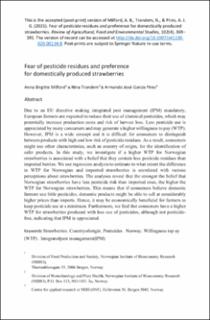Fear of pesticide residues and preference for domestically produced strawberries
Peer reviewed, Journal article
Accepted version
Permanent lenke
https://hdl.handle.net/11250/2837598Utgivelsesdato
2021-01-12Metadata
Vis full innførselSamlinger
Originalversjon
Milford, A. B., Trandem, N., & Pires, A. J. G. (2021). Fear of pesticide residues and preference for domestically produced strawberries. Review of Agricultural, Food and Environmental Studies, 102(4), 369–391. 10.1007/s41130-020-00134-8Sammendrag
Due to an EU directive making integrated pest management (IPM) mandatory, European farmers are expected to reduce their use of chemical pesticides, which may potentially increase production costs and risk of harvest loss. Less pesticide use is appreciated by many consumers and may generate a higher willingness to pay (WTP). However, IPM is a wide concept and it is difficult for consumers to distinguish between products with high and low risk of pesticide residues. As a result, consumers might use other characteristics, such as country of origin, for the identification of safer products. In this study, we investigate if a higher WTP for Norwegian strawberries is associated with a belief that they contain less pesticide residues than imported berries. We use regression analysis to estimate to what extent the difference in WTP for Norwegian and imported strawberries is correlated with various perceptions about strawberries. The analyses reveal that the stronger the belief that Norwegian strawberries have less pesticide risk than imported ones, the higher the WTP for Norwegian strawberries. This means that if consumers believe domestic farmers use little pesticides, domestic products might be able to sell at considerably higher prices than imports. Hence, it may be economically beneficial for farmers to keep pesticide use at a minimum. Furthermore, we find that consumers have a higher WTP for strawberries produced with less use of pesticides, although not pesticide-free, indicating that IPM is appreciated.
